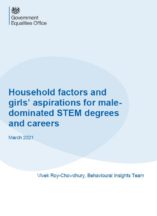This research project investigated why girls are less likely than boys to choose STEM subjects (such as engineering, physics and maths) at university.
Using existing survey data from a large-scale longitudinal study (Understanding Society), we used regression analysis to identify factors that are associated with the gender gap in aspirations to study these subjects. This included a range of socioeconomic and demographic variables at the parent, child and household level, plus additional variables including parenting styles and children’s self-confidence, beliefs, and career plans.
Key findings included strong relationships between mothers’ characteristics and beliefs and their daughters’ aspirations. These findings suggest mothers could play a powerful role in policy solutions to increase girls’ representation in STEM degrees and occupations.
This piece of work was part of the Gender & Behavioural Insights Programme, funded by The Government Equalities Office. Read more of the programme’s insights for equality here.


